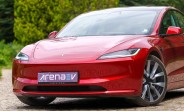Tesla's US market share drops to an 8-year low
For the last decade or so, buying an electric car in the United States often meant buying a Tesla. The company, led by Elon Musk, was the undisputed king, at one point accounting for more than 80% of all electric vehicle sales. But that kingdom is shrinking. New data reveals that Tesla's dominance is facing its biggest challenge yet, with its share of the American EV market tumbling to a level not seen in nearly eight years.
According to research firm Cox Automotive, Tesla's slice of the EV sales pie fell to just 38% in August. This is the first time the brand has dropped below the 40% threshold since October 2017, a time when it was just beginning to produce its first mass-market vehicle, the Model 3.

What's even worse is that this decline is happening even as the overall market for electric cars is booming. A rush of buyers is trying to get their hands on a new EV before the $7,500 federal tax credit expires at the end of September, creating a temporary sales frenzy.
The tide might be rising for EVs, but it isn't lifting all boats equally. In July, overall sales of new electric cars jumped by more than 24% compared to the previous month. Unfortunately, Tesla's sales grew by only 7%. That trend then continued into August, with the broader market growing by 14% while Tesla saw only a 3.1% increase.

This growing gap highlights a fundamental shift: customers now have a lot more choices, and they are exploring them. Automakers like Ford, Hyundai, Kia, and Toyota are no longer just competitors on paper; they are actively stealing sales with fresh models and attractive deals.
Much of Tesla's challenge comes from its own garage. Competitors are rolling out new sedans, SUVs, and trucks, and Tesla's lineup started showing its age. The last major vehicle launch was the polarizing Cybertruck in 2023, which hasn't seen the mainstream success of the Model 3 or the Model Y.

A refresh of the Model Y wasn't enough, and it was met with a shrug from many consumers. Rather than focus on new, affordable electric cars, Tesla decided to pivot to humanoid robots and self-driving robotaxis. Sure, it's a futuristic vision that gets shareholders excited, but it doesn't really help a family looking for a new car today.
The numbers paint a painful picture of the company's rapid descent through the ranks. In June this year, Tesla still commanded 48.7% of the US market, but that dropped to 42% in July and then again to 38% in August. To make matters even worse, Tesla's global sales have been sliding since 2023, with big drops in key markets like Europe, where sales are down by as much as 40%.

The road ahead looks bumpy for every EV maker. Analysts predict the sales surge will come to a screeching halt when the tax credit expires, leading to a sales crash in the final quarter of the year. This will increase the financial pressure on all automakers.
For Tesla, it presents a difficult choice: continue cutting prices to attract buyers, which shrinks already-thinning profit margins, or hold the line on price and risk watching its market share fall even further. "When you're a car company, when you don't have new products, your share will start to decline," said Stephanie Valdez Streaty, an industry analyst at Cox Automotive. For now, it seems car buyers agree.





Facebook
Twitter
Instagram
RSS
Settings
Log in I forgot my password Sign up